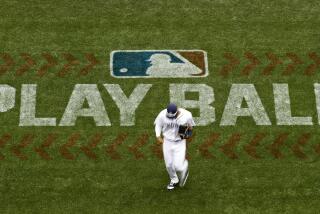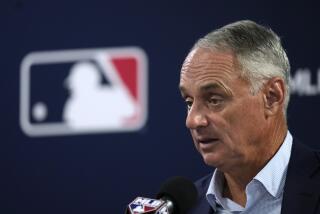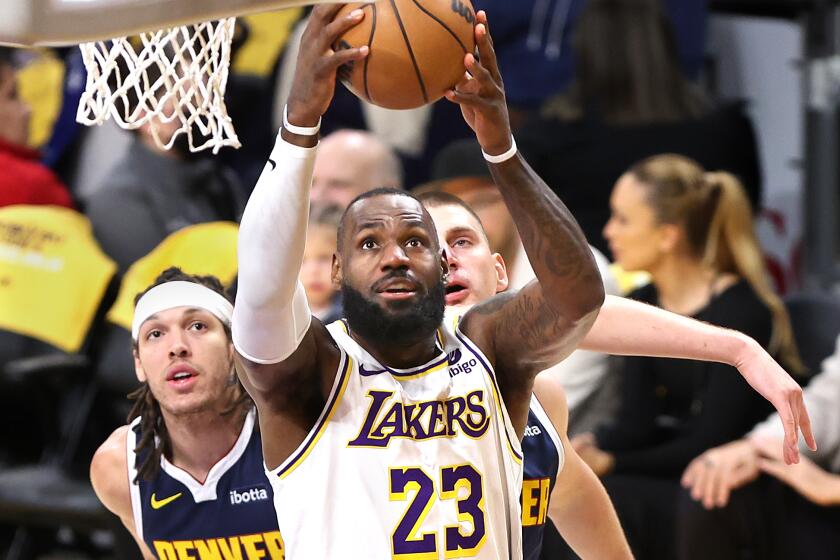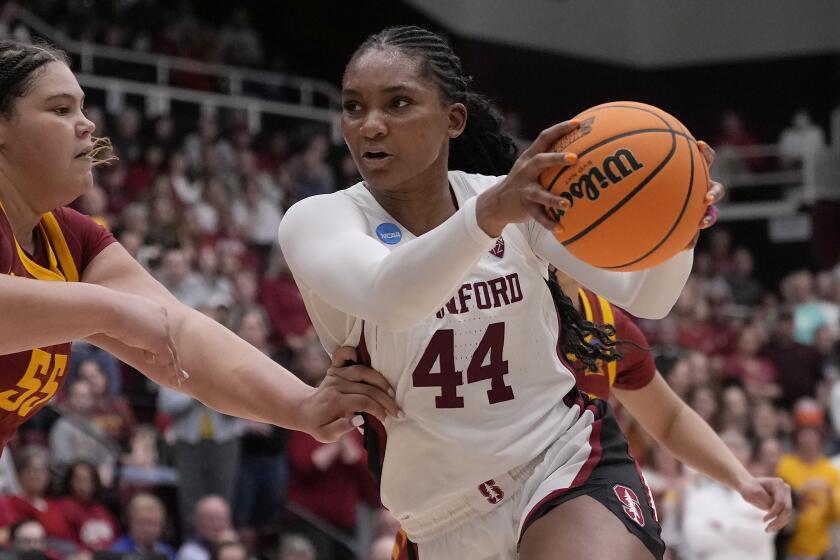Q&A with MLB Commissioner Rob Manfred
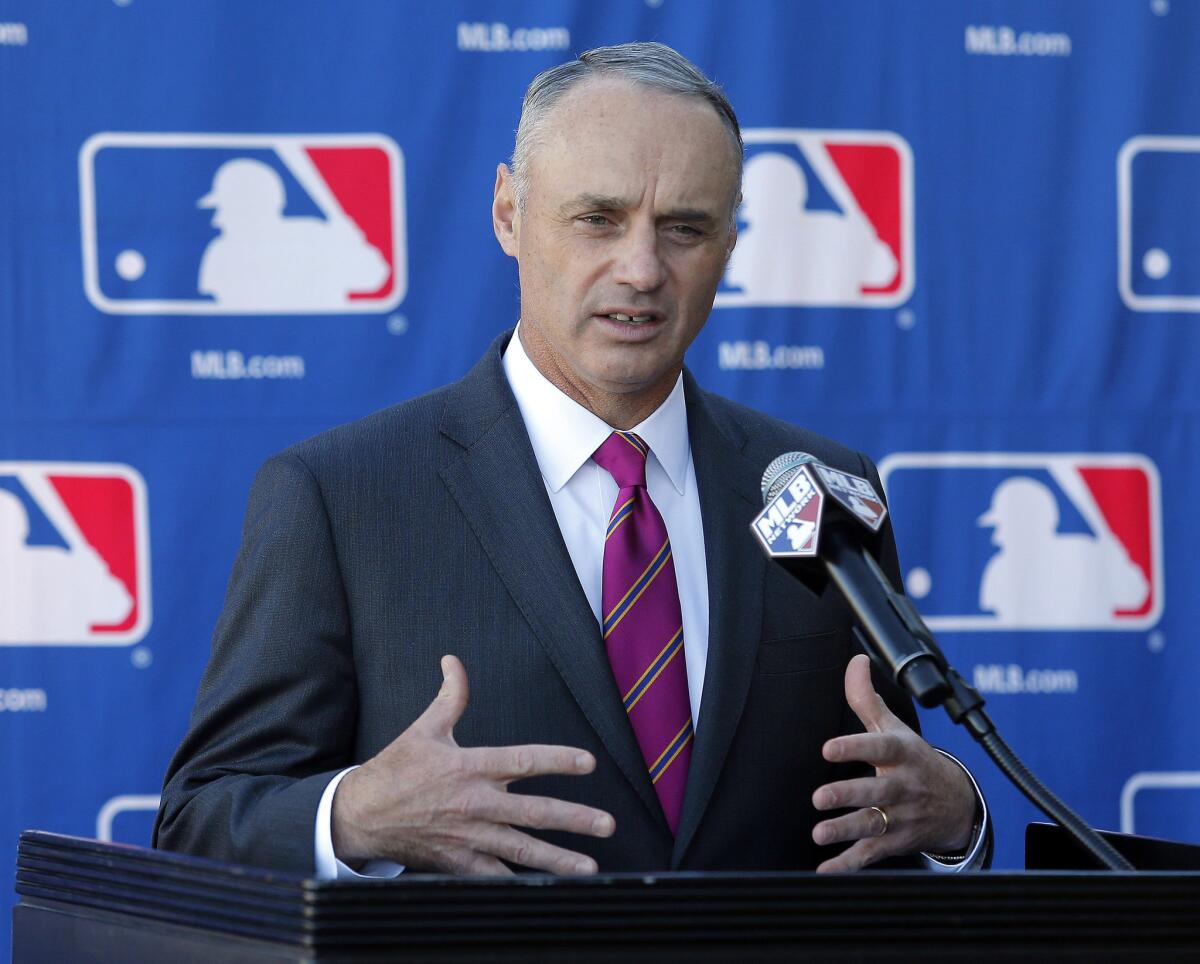
Rob Manfred recently took office as the 10th commissioner of Major League Baseball. Manfred replaced Bud Selig, who retired after serving since 1992.
Here is a transcript of an interview between Manfred and Times national baseball writer Bill Shaikin:
When you were elected as commissioner, you deferred comment on what your priorities might be, in part because Selig still had five months left in office. Now that you are commissioner, what can you say about your priorities?
I can give you a few things I want to be focused on. First of all, it’s really important for us to be focused on young people. I see at least two distinct pieces to that.
First, it’s participation. We need to engage more fully with all of the various aspects of amateur baseball, to make sure we have more kids and more of the best athletes playing the game. It’s important to have the best athletes in order to make our game compelling, and it’s important for kids to play, because all the studies show it’s the first step to becoming a fan.
I think the second piece of it with young people is that we need to make sure that what I think of as the generational aspect of our game continues. What I mean by that is that we want parents and grandparents to get their kids into the park at an early age, and instill in those young people the love of the game that our generation has.
We have heard this is a lost battle — football already dominates, baseball’s days as the national pastime are over, and the kids who are not interested in football probably are off playing a video game. Why do you believe it is not too late for baseball?
There are a lot of positive signs that people tend to overlook. Right after the first of the year, I was in Florida with my family. On the way home, we stopped at the American Baseball Coaches Assn. convention. When you see 7,000 people who work in the youth space gathered in Orlando, three days after New Year’s, you know you are not in a fight that has been lost.
When you go to Williamsport and you see what the Little League World Series is about, and you realize a championship game is on national television, you realize the fight is not lost.
When you understand that 5.7 million people a day, with an average age of 33, open the At Bat app every day during the season, you realize this fight is not lost.
It does not appear to be a coincidence, then, that you have promoted the guy who ran mlb.com and the guy who ran MLB Network to be two of your top lieutenants. What does that reflect about your priorities and how you want to attack them?
Right, and this second piece is really related to the first. Look, we own a world-class technology company. Forget about a sports website. We own a world-class technology company. A great vehicle for engaging younger people with the game is through the use of technology. I think it’s important that we take all the ability, brainpower and muscle that is embedded in that company and use it to make sure our broadcasts are as good as possible, and to make sure our in-park experience is as good as possible. There is nothing that attracts kids like technology.
So technology is a really important area for me. And it relates to a third thing: I think Commissioner Selig has done, in his own way, at his own pace, an amazing job of modernizing the game without messing up the traditions. It goes back to three divisions and a wild card, and it runs all the way up through instant replay. The difference between those ends of the spectrum is that three divisions and a wild card was about having a good idea. Instant replay was successful because you had a good idea and you applied technology to it. We need to continue to modernize the game, always respectful of its traditions, and I think that modernization process is another place where technology will be very important for us.
Given how lucrative local television contracts are, baseball appears to have become a regional sport. The Fox Saturday “Game of the Week” broadcasts are regionalized. In October, ratings drop in part because you’re not invested once your team is out — not the case in other sports, football in particular. It’s more national. Is baseball so trapped in the box of prospering as a regional sport that it can’t go back to being a national sport?
I think that option is available to us. I think it is a challenge for us. Take the comparison to the NFL. It’s one day a week. We ask our fans to engage basically every single day, for 183 days. You can’t possibly engage with all 30 teams with that kind of a schedule over the course of a season.
What we need to do a really good job with, going forward, is to make sure that … the end of the season is as exciting as it can possibly be, that there are as many teams still in contention as possible, and that we have story lines that build through that exciting period, into the early rounds of the playoffs and then, ultimately, up through the World Series.
The Kansas City story is a great example of that. I think the level of interest in the World Series, because of the Kansas City story line, was probably disproportionate to what some people might have expected, given the size of the market.
In terms of keeping that interest alive at the end of the season, are you considering whether to expand the playoffs?
No. One thing that we have not kicked around is additional changes to the playoffs. We’re only two years into the one wild-card game. I think we’re going to go with that format for a little longer than two years before we start thinking about changes.
Selig always said he would tell owners to judge him by their asset values. Given the revenues when he started ($1 billion per year then, $9 billion now), that might be reasonable, but now the game is in a much better place. Understanding that you work for the owners and not the fans, how should fans judge your commissionership?
I think they should judge based on whether I have been an effective steward of the game, whether I have been a good enough businessman to keep the owners pleased with the way the game is being run, and at the same time continuing to deliver to them a product on the field that is compelling in terms of its competitiveness.
Baseball has enjoyed two decades of labor peace, with the current collective bargaining agreement expiring in 2016. Negotiations are impossible to predict until you sit down and talk. But, given the health of the game, is there any reason you can see here today that fans should worry a labor shutdown might be coming?
I can remember the first labor negotiation after I came in [2002]. It was touch and go as to whether we were going to be able to make a deal. We really needed to make a deal for the good of the game. I can remember I was not all that crazy doing the press every night. There was a lot of pressure. And I can remember [former MLB spokesman] Rich Levin saying to me, “Just keep going out there and telling them you know we’re going to make a deal. Just keep saying it.” And I kind of have made that my thought through the last three negotiations.
I think that, with our relationship with the MLBPA, combined with the health of our sport, we will find an agreement, just like we have the last three times around.
It seems like clockwork that, every time a player signs what is perceived as an outrageously large contract, somebody — an owner, a team president, or somebody affiliated with a club — will say “Gosh, isn’t it time for a salary cap?” Can you at least say that is not going to be on the table?
It’s not appropriate for me to talk about priorities or take issues off the table before I have even had the chance to begin the preparation process with the owners. It’s always true that our bargaining posture is dictated by the desire of a majority of the owners. We haven’t even begun that process yet. So I’m not going to say anything one way or the other about any particular position.
Historically, though, isn’t it safe to say that, from the point the owners took the salary cap off the table, baseball has had labor peace ever since?
Yes. I think that, historically, that is accurate.
Selig was a baseball man, and before that he was in the car business. You are a lawyer. So is Adam Silver, the new NBA commissioner, and Gary Bettman, the NHL commissioner. What do you think a lawyer brings to a commissioner’s table that might not have been needed 30 or 40 years ago?
One thing that is clearly different than it was 30 or 40 years ago is that the players are the product. The players are unionized. Dealing with unionized employees is the bailiwick of lawyers. So I think that is one factor that is important. I also think lawyers have changed, to tell you the truth. I think more and more lawyers have stopped practicing law and have gone out and engaged in much broader activities as their careers go on. That certainly has been true of my career. So, while I am a lawyer and will always be one, I have done a lot of other things, and I think the same is true of Adam and Commissioner Bettman.
When Selig came to you and said, “It’s time. We have to change the Dodgers ownership. Find me a way to get rid of Frank McCourt,” how difficult was that to do?
That is not exactly the conversation that took place. But there did come a point in time where Commissioner Selig felt a change in Dodgers ownership was in the best interests of the game. It was a unique set of circumstances. I don’t think we had ever been confronted with a circumstance where any commissioner felt a change was really necessary to preserve the best interests of the game and protect the fans. It was a difficult project, because it was a unique project. It became more difficult when the bankruptcy process got laid over the top, because, whether it’s in baseball or anywhere, bankruptcy by design is a process that takes some control away from the parties involved.
If the goal was to change ownership, clearly you were successful. But the league gave up a lot of control, in bankruptcy and in the sale process. Did you give up too much in terms of setting a precedent, or did you simply accomplish what you needed to accomplish?
Look, the way I think about all projects like this is, what is the end outcome? Mr. McCourt got an amazing price for the franchise, and the fans in L.A. got a well-financed, talented, new ownership group that has produced a very competitive team in a very short period of time. I regard those two things, together, to have produced a really good outcome.
Whenever you have a difficult problem, you are going to make compromises along the way. We think we made the right ones and ended up with a very good result.
You have said the Oakland Athletics need a new stadium. MLB has said this for a decade. In 2009, after the A’s asked to move to San Jose, Selig formed a committee and said the league would take charge of the process. In 2010, when San Jose was ready to put a ballpark on the ballot, the league asked the city to hold off. The committee was disbanded without any public report, and San Jose sued because the league would not announce a decision. So how responsible is MLB for the fact that the A’s stadium situation has not been solved?
Look, I think there are a variety of factors that have made it difficult to get this issue resolved. Can I say that everything MLB decided to do, in retrospect, was correct? No. I will say this: I am committed to the idea that we are going to do everything possible to get the A’s a new facility as quickly as humanly possible.
Within their territory? (The San Francisco Giants have territorial rights to San Jose and have no interest in any resolution that lets the A’s move there.)
I’m going to go no further. I will say this: Baseball has always had a policy of encouraging teams to stay where they are. We think our teams form a bond with their communities, and I think that is an important policy.
Why did you disband the committee?
I think that the committee served its purpose. It developed a lot of factual information, and going forward my preference is to engage more directly with the owners, the Fishers and Lew Wolff, in an effort to get the problem solved.
MLB has talked since last fall about implementing a domestic violence policy. Can one be put in place by spring training?
We are in active conversations with the MLBPA about domestic violence issues, and I am confident we are going to have an agreement before spring training.
How much thought have you given to what has taken place with regard to the United States’ changing relationship with Cuba? Could there be spring training games there? World Baseball Classic games? Academies?
There are wonderful possibilities. We are paying a lot of attention to Cuba. We are planning and thinking about what our response should be, depending on what happens with the applicable federal regulations. We just don’t know enough about what those changes are going to be, in order for us to be concrete in any way about plans, or what can be done in what period of time.
You said you were comfortable with linking victory in the All-Star game to home-field advantage in the World Series. The television ratings are not any better for the All-Star game, a primary reason Selig gave for the change, the players are not fans of it, and it skews what the manager has to do in the game. Is there any thought to finding a better way?
First of all, ratings in today’s world, judging them year over year, there’s just so much change going on that to say the ratings are the same, that may be a damn good result. But let’s put that aside. My view on the home-field advantage is that it has altered the way the game has been played in a positive way for the fans. Anything that makes the game better for the fans, I’m going to move very slowly on, in terms of making a change.
Montreal is working hard to get an MLB team back. Are there any thoughts of expansion?
There has not been a lot of talk about expansion. In terms of internationalizing the game, North America, in terms of sustained international activity, is someplace we need to focus. Canada, Mexico, if we were going to think about it, those would be the kinds of places that I would be interested in.
With the markets you would look at it in North America, would it seem as if your best available markets are not United States markets?
I think that is probably right.
The one thing you hear a lot about in terms of marketing, and maybe this goes back to whether baseball is a regional sport or a national sport, is that baseball players do not seem to have the national profile of players in other sports. Is there any reason why a Mike Trout or a Clayton Kershaw should not be as popular nationally as LeBron James? If there isn’t, then how do you do it?
I think that it is important for us to continue to expand our partnership with the players in a way that makes stars, national stars, out of our very best players. I think that goes back a little bit to the question you asked about the postseason. If you do a good job marketing your players all year long, and Clayton Kershaw is a big star and it’s “the Los Angeles Dodgers and Clayton Kershaw” in the postseason, I think it helps you, in terms of a national audience.
More baseball coverage:
MLB strategy emphasizes national market, young fans
More to Read
Get our high school sports newsletter
Prep Rally is devoted to the SoCal high school sports experience, bringing you scores, stories and a behind-the-scenes look at what makes prep sports so popular.
You may occasionally receive promotional content from the Los Angeles Times.

